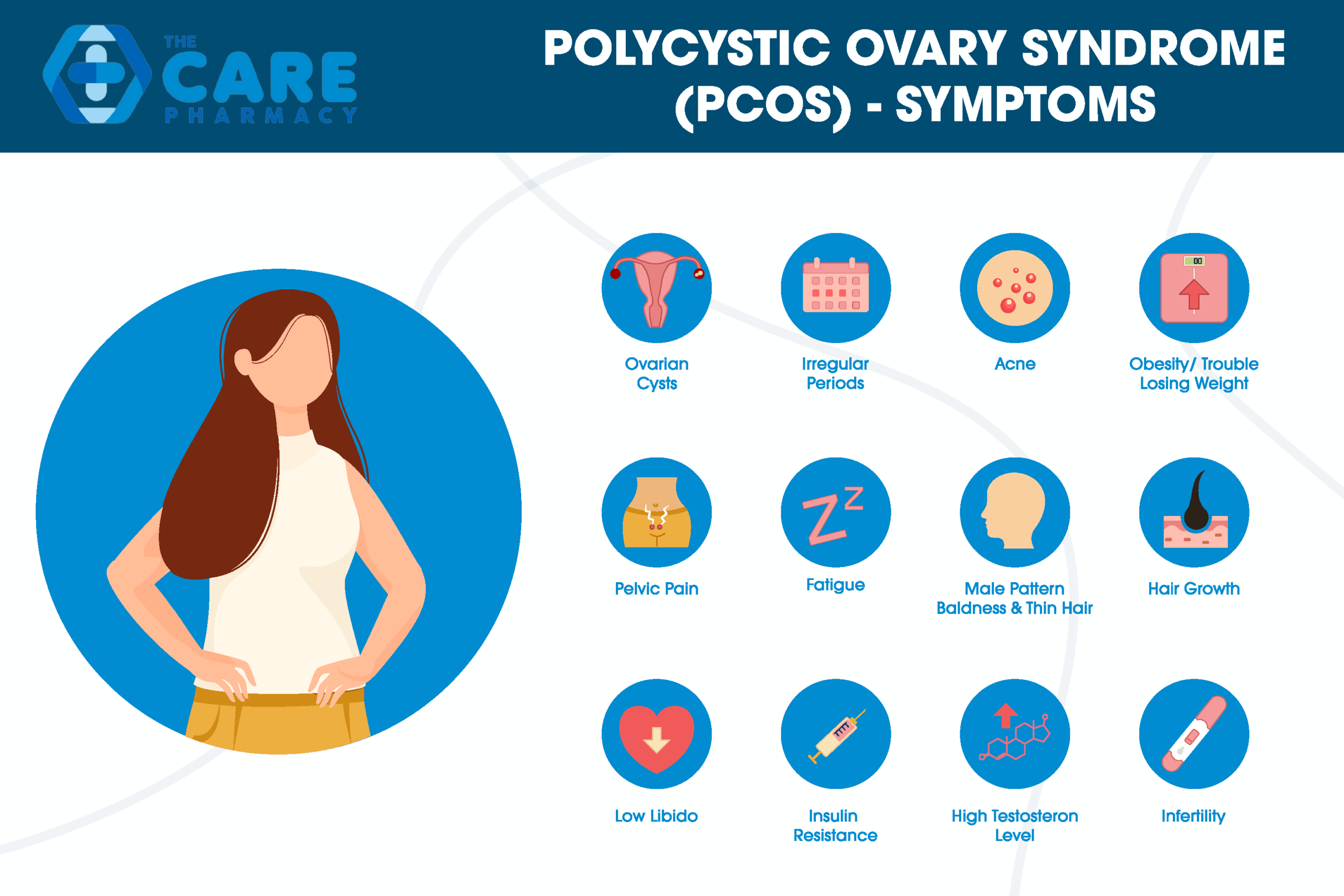Polycystic Ovary Syndrome (PCOS) is a common hormonal disorder affecting 1 in 10 women in the UK. It is often linked to insulin resistance, weight gain, and metabolic issues, making weight management a crucial part of managing the condition.
Mounjaro is a once-weekly injectable medicine approved for weight loss and type 2 diabetes in the UK. It targets two key hormones that help control blood sugar levels and reduce appetite. This makes the body more sensitive to insulin, lowers blood sugar, and aids in weight loss.
According to research, Mounjaro helps treat and manage PCOS symptoms, such as insulin resistance and obesity.
What is PCOS?
Polycystic Ovary Syndrome (PCOS) is a common hormonal disorder that affects women of reproductive age. It occurs when the ovaries produce an excess amount of androgens (male hormones), leading to hormonal imbalances that disrupt the menstrual cycle and cause various health issues. PCOS can affect fertility, metabolism, and overall well-being.
Symptoms of PCOS

PCOS symptoms vary from person to person, but common signs include:
1. Irregular Periods
- Infrequent, irregular, or prolonged menstrual cycles.
- Some women may experience fewer than eight periods a year or have cycles longer than 35 days.
2. Excess Androgen Levels
- Hirsutism: Excessive hair growth on the face, chest, or back.
- Acne: Persistent breakouts due to increased oil production.
- Thinning Hair: Hair loss or scalp baldness similar to male-pattern hair loss.
3. Weight Gain and Difficulty Losing Weight
Many women with PCOS struggle with unexplained weight gain, especially around the abdomen.
4. Insulin Resistance and High Blood Sugar
The body becomes less responsive to insulin, leading to high blood sugar levels. It increases the risk of type 2 diabetes and metabolic disorders.
5. Fertility Issues
PCOS can cause irregular ovulation or lack of ovulation, making it difficult to conceive. It is one of the leading causes of infertility in women.
6. Mood Changes and Fatigue
Women with PCOS often experience mood swings, depression, anxiety, and low energy levels.
7. Dark Skin Patches (Acanthosis Nigricans)
Dark, velvety skin patches, usually on the neck, underarms, or groin, are linked to insulin resistance.
What are the Causes of PCOS?

The exact cause of PCOS is not fully understood, but several factors contribute to its development:
1. Hormonal Imbalance
Increased levels of androgens (male hormones) prevent the ovaries from releasing eggs, leading to irregular periods and fertility issues.
2. Insulin Resistance
The body’s inability to use insulin properly causes higher insulin levels, which trigger more androgen production, worsening PCOS symptoms.
3. Genetics
PCOS often runs in families, meaning you are more likely to develop it if your mother or sister has it.
4. Inflammation
Low-grade inflammation can cause the ovaries to produce excessive androgens, leading to hormonal imbalances and weight gain.
PCOS Leads to Other Health Conditions
Women with Polycystic Ovary Syndrome (PCOS) are at a higher risk of developing several health conditions, including:
- Type 2 diabetes and insulin resistance
- Cardiovascular disease
- Obesity and metabolic syndrome
- Infertility and pregnancy complications
- Depression and anxiety
- Endometrial cancer
- Sleep apnoea
What is Mounjaro?
Mounjaro is a prescription-only injectable medication containing tirzepatide, approved for the management of type 2 diabetes and weight loss.
Although Mounjaro is not licensed to treat PCOS, your healthcare provider may prescribe it if you meet the eligibility criteria because it will help your PCOS symptoms.
How Does Mounjaro Work?
Mounjaro (Tirzepatide) is a dual-action GLP-1 and GIP receptor agonist. It helps regulate blood sugar and appetite by:
- Increasing insulin production to control blood glucose levels.
- Slowing digestion, making you feel fuller for longer.
- Suppressing appetite, leading to reduced calorie intake and weight loss.
Injecting Mounjaro once a week works the same way each time. This means it treats obesity by keeping you fuller for longer and reducing your appetite, so you can eat fewer calories without constantly feeling hungry. It also helps regulate blood sugar levels, making it easier to manage type 2 diabetes.
How Mounjaro Can Help You with PCOS?

There is no definitive cure for PCOS, but its symptoms can be effectively managed through lifestyle changes, medications, and medical treatments. The goal is to regulate hormones, improve insulin sensitivity, and reduce associated health risks.
Mounjaro for PCOS can help in several ways, such as weight loss and treating insulin resistance, leading to better weight management, symptom improvement, and enhanced fertility.
1. Reducing Insulin Resistance
50%-90% of women with PCOS and obesity struggle with insulin resistance, which can lead to weight gain and high blood sugar. Mounjaro helps increase insulin sensitivity, lowering blood glucose levels and reducing the risk of Type 2 diabetes.
2. Aiding Weight Loss
If you have PCOS, you may find it harder to lose weight, and much of this is linked to insulin resistance. When your body struggles to use insulin effectively, it stores more fat, particularly around the abdomen, making losing weight even more challenging.
According to the NHS, losing just 5% of your body weight can significantly improve PCOS symptoms, including menstrual irregularities, insulin resistance, and excess androgen levels. This is why weight loss is often one of the first treatment recommendations for women with PCOS who are overweight or obese.
How Mounjaro Helps with Weight Loss in PCOS?
Mounjaro (tirzepatide) can be a game-changer for women with PCOS who have struggled to lose weight despite making lifestyle changes. It is prescribed alongside a healthy diet and exercise plan to enhance weight loss efforts and improve PCOS-related symptoms.
- Mounjaro Reduces Appetite and Food Cravings
- Slows digestion, keeping you fuller for longer.
- Suppresses hunger hormones, helping you eat less without feeling constantly hungry.
- Mounjaro Improves Insulin Sensitivity
- Enhances insulin response, reducing fat storage and promoting weight loss.
- Helps lower excess androgen levels, which can improve menstrual cycles and hormonal balance.
- Mounjaro Supports Fat Loss, Not Just Weight Loss
- Helps the body burn fat while preserving muscle mass.
- Reduces abdominal fat, which is common in PCOS.
- Mounjaro Regulates Blood Sugar Levels
- Prevents blood sugar spikes, reducing fat accumulation.
- It lowers chronic inflammation, which can make weight loss easier.
How Much Weight Can You Lose with Mounjaro?
Mounjaro has been clinically proven to support substantial weight loss. In trials, people taking the highest dose (15mg per week for 72 weeks) lost up to 22.5% of their starting body weight.
Is Mounjaro a Long-Term Weight Loss Solution for PCOS?
Mounjaro can jumpstart your weight loss, but lasting results depend on healthy lifestyle changes. It works best with a balanced diet, regular exercise, and ongoing medical support.
If you’ve been struggling to lose weight with PCOS, Mounjaro could help you break through plateaus and achieve meaningful results. Speak to our expert clinicians to find out if Mounjaro is the right option for you.
3. Regulating Hormones and Menstrual Cycles
Weight loss and improved insulin sensitivity may help restore normal menstrual cycles and reduce symptoms like acne and excess hair growth. Some users report more regular periods after losing weight on Mounjaro, though more studies are needed to confirm this effect.
4. Potential Fertility Benefits
Since PCOS is a leading cause of infertility due to irregular ovulation, improving weight and insulin resistance could increase the chances of natural conception. However, Mounjaro is not specifically approved for fertility treatment, and more research is required.
Can You Take Mounjaro for PCOS?
No, you cannot take Mounjaro to treat PCOS specifically. However, your clinician can prescribe it if you have PCOS along with obesity or type 2 diabetes.
Who Can Take Mounjaro for PCOS?
If you’re overweight or obese and have been diagnosed with PCOS (Polycystic Ovary Syndrome), you may be eligible for a Mounjaro prescription. At The Care Pharmacy, you can check your eligibility by meeting one of the following criteria:
BMI of 30 or Higher (Obesity)
- Even if you don’t have PCOS or another weight-related condition, you can still benefit from Mounjaro if your BMI is 30 or above.
- If you’re experiencing symptoms of PCOS but haven’t been diagnosed, consider speaking to your doctor for an evaluation.
BMI Between 27 and 30 (Overweight) + a Weight-Related Condition
- If your BMI falls between 27 and 30, you may qualify for Mounjaro if you have a weight-related health condition, such as:
- Hypertension (high blood pressure)
- Dyslipidemia (abnormal levels of cholesterol or other fats in the blood)
- Obstructive sleep apnea
- Diabetes
Check Your Eligibility at The Care Pharmacy
Not everyone who is overweight or has PCOS will be suitable for Mounjaro. Certain medical conditions or medications could make it unsafe. Your GP or one of our clinicians will assess whether Mounjaro is right for you.
🔍 Take our online assessment today to find out if you’re eligible!
Start Your Journey with Mounjaro

Starting from: £119.99
Get Started
FAQs
Can Mounjaro be prescribed for PCOS?
Mounjaro cannot be prescribed for PCOS specifically. However, it can be prescribed to cure obesity, one of the symptoms of PCOS. If you have PCOS and a BMI of 27+ with a weight-related condition (such as diabetes or high cholesterol), or a BMI of 30 or higher, you may be eligible for a Mounjaro prescription.
What is the best weight loss medication for PCOS?
The best weight loss medication for PCOS depends on your specific needs. Mounjaro, Wegovy (semaglutide), and Saxenda (liraglutide) are all GLP-1 receptor agonists that can support weight loss in people with PCOS by reducing appetite and improving insulin sensitivity.
– Mounjaro (Tirzepatide) – Targets GLP-1 and GIP receptors, potentially more effective for weight loss and insulin resistance.
– Wegovy (Semaglutide) – A once-weekly injection that helps with appetite control and blood sugar management.
– Saxenda (Liraglutide) – A daily injection that supports gradual weight loss and metabolic health.
If you have PCOS, your GP will recommend the best option based on your weight, medical history, and insulin resistance levels.
Does Mounjaro help with hormonal imbalance?
Mounjaro is not a direct hormone therapy, but it can indirectly help balance hormones in women with PCOS by:
- Reducing insulin resistance can lower testosterone levels and improve ovulation.
- Promoting weight loss, which helps regulate oestrogen and menstrual cycles.
- Lowering inflammation can improve overall hormone balance.
Mounjaro is not a cure for PCOS, weight loss and improved insulin levels can support hormonal health and reduce symptoms like irregular periods, acne, and excessive hair growth.
What weight loss pen is best for PCOS?
The best weight loss pen for PCOS depends on your health concerns. Mounjaro, Wegovy, and Saxenda are all injectable weight loss treatments that can help with PCOS-related weight gain.
Does Mounjaro stop your periods?
There are no clinical studies that directly link Mounjaro to changes in the menstrual cycle. However, significant weight loss and hormonal changes can affect your menstrual cycle. If PCOS has caused irregular cycles, Mounjaro can improve ovulation by lowering insulin resistance. Moreover, If you experience rapid weight loss, your body may temporarily adjust by changing hormone levels, leading to irregular cycles.
If your periods become irregular or stop completely, speak to your GP or healthcare provider to rule out nutrient deficiencies, hormonal imbalances, or other health concerns.
Does Mounjaro affect your fertility?
There is no evidence that Mounjaro harms fertility. In fact, it may have the opposite effect. Reaching a healthy weight can improve blood sugar levels, reduce insulin resistance, and balance hormones, all of which can enhance fertility and make it easier to conceive.
Does Mounjaro affect sleep?
Mounjaro does not typically cause sleep issues. However, some may experience temporary insomnia or fatigue due to appetite changes, hormonal imbalance or gastrointestinal side effects.
Medically reviewed by
Mohammed Lakhi
Superintendent Pharmacist















